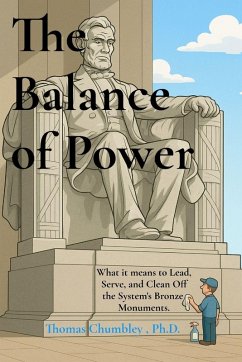Be prepared to have your thinking challenged. The structure is progressively built, from definitional clarity to historical depth, from system critique to personal responsibility. The genre is decidedly non-fiction, political philosophy, leadership, and organizational theory with subgenres of Leadership and Ethics, political science/governance, History of Power and Institutions, with Social Commentary. Comparable Titles may include: The True Believer by Eric Hoffer, The Righteous Mind by Jonathan Haidt, Dominion by Tom Holland, Power and Influence by Robert Greene, Leadership and Self-Deception by the Arbinger Institute, The Origins of Political Order by Francis Fukuyama. The writing style is philosophically rich but accessible with a blend of narrative, didactic exposition, and case-based analysis. The voice is thoughtful, serious, occasionally personal, with strong moral overtones. The narrative voice alternates between academic-philosopher, moral leader, and reflective practitioner with use of rhetorical framing, triplets, and contrast structures. The tone appears intellectually assertive and moralistic, combining academic structure with applied insights, high-concept vocabulary, making it more readable than dense scholarly work but still elevated in tone. The target audience would be mid-to-senior-level executives, leaders, or organizational thinkers; individuals in policy, government, education, or faith-based leadership roles; academically curious readers with an interest in power, ethics, and societal systems, and it may be suited for graduate students in leadership, philosophy, or political science. The great risk of this book is that it utterly fails to convey the urgency of the matter. The author provides historically grounded examples that are relevant and intellectually effective. To not bias, the readers are expected to draw inferences themselves to potential current applications. The tone remains measured, analytical, and philosophical - making the problem feel theoretical rather than imminent - as the problem most certainly is. The problem is that modern societies have lost their ability to meaningfully constrain power because they no longer agree on the foundations that justify those constraints. If societies abandon shared moral foundations, the mechanisms meant to restrain power- laws, institutions, customs-will become performative, brittle, and ultimately ineffective. Without moral coherence: 1.Checks and balances lose force-because no one believes in the why behind them. 2.Leadership becomes transactional-measured only by results, not character. 3.Citizens grow apathetic or tribal, lacking a shared language of justice or truth. 4.Power becomes self-legitimating-those who hold it define what is "good" or "necessary." Without moral legitimacy, we cannot meaningfully limit power-and what we cannot limit, we will eventually be ruled by. This isn't just about policy or leadership style. It's a caution that: 1.A culture without moral ballast will drift toward domination, even if clothed in the language of rights or progress. 2.The decay won't arrive with jackboots or guns-it will come through bureaucratic momentum, ideological capture, or administrative sprawl. 3.By the time it is recognized, it will be difficult-perhaps impossible-to reverse. This is not merely a call to reflect. It is a warning: Where power expands and moral clarity fades, freedom will not end suddenly-it will dissolve silently, until no one remembers how to resist it. As Solzhenitsyn warned in The Gulag Archipelago: "We didn't love freedom enough... we purely and simply deserved everything that happened afterward."
Bitte wählen Sie Ihr Anliegen aus.
Rechnungen
Retourenschein anfordern
Bestellstatus
Storno








